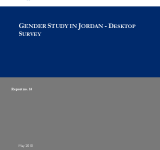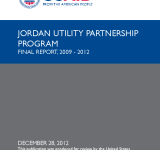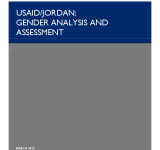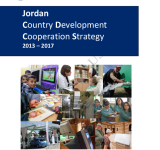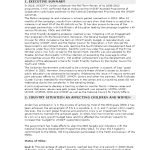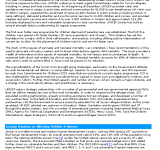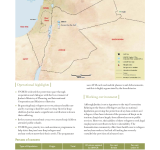والمشاركة
The report presents the findings of a desktop survey conducted to review gender studies in Jordan with an overall goal of the survey as to ensure that gender is adequately addressed throughout project research;; analysis and activities of the Public Action for Water;; Energy and Environment Project (PAP). Under the PAP mandate to encourage water and energy conservation and to support behavior change towards more conservation and efficient practices both at the household level and in the commercial;; industrial and civil society arenas using social marketing behavioral methods;; the report is based on a gender desktop review of existing research on gender and natural resource management in Jordan. It capitalizes on the growing body of research on gender across sectors in Jordan including natural resource management;; to apply and adapt the findings to the PAP project activities. The report concludes with recommendations for the PAP projects such as donor collaboration;; improvement of women’s knowledge of water and energy saving methods;; engagement and creation of women’s participation to promote and support opportunities for small;; women-owned business promoting water and energy saving technologies and promotion of alternative technologies.
This publication aims to summarize and assess the results of the United States Energy Association (USEA)’s Jordan Energy Partnership Project (JUPP);; funded by the USAID. The JUPP is part of the USEA/USAID Energy Utility Partnership Program (EUPP);; which assists developing countries with increasing environmentally sustainable energy production and use and improving the operational efficiency and increased financial viability of their utilities and related institutions. The JUPP focuses on improving the technical and operational efficiency of Jordan’s electric utilities and electric grid. Defining energy insecurity as one of the most significant problems in Jordan;; the report summarizes the program’s activities and assesses their results and impacts. It looks at multiple aspects including the utility participant training and female participation. The results of the publication are increasing system efficiency;; developing customer energy efficiency programs;; increasing corporate efficiency;; supporting capacity building;; reducing electricity losses and power outages;; improving transmission dispatch center operations;; enhancing worker productivity through safety and interconnecting renewable energy and distributed generation. The report concludes with key lessons learned from the projects.
The report presents an up-to-date analysis of gender disparities in Jordan to inform development assistance programs by the USAID for the 2013-2017 strategic plan. The assessment report is prepared by the Global Health Technical Assistance Project;; funded by USAID Jordan and therefore;; it is based on a literature review and field work of the 21 focus group discussions held in Amman;; Irbid;; Tafileh and Zarqa. The report establishes that Jordan has begun to transition to a knowledge-based economy with the national advantage as its people. It also points out that despite the investments that have helped address gender equality issues;; Jordan continues to bear low female participation in the labor markets;; gender stereotypes about the role of females and males and conservative cultural norms. The report includes a sector-by-sector analysis;; recommendations;; gender review and an illustrative implementation plan. It concludes with key recommendations on the wide breadth of the USAID Jordan portfolio with a key emphasis on gender issues.
Defining the goal as improved prosperity;; accountability and equality for a stable;; democratic Jordan;; the strategy report highlights a long-standing partnership between Jordan and the United States. Amidst a number of challenges;; Jordan continues to play a strategic ally in the region and therefore;; the report stresses the importance of assisting Jordan in carrying out its stated commitment to broad-based political and economic reforms. The three development objectives are 1. Broad-based;; inclusive economic development accelerated;; 2. Democratic accountability strengthened;; and 3. Essential services to the public improved;; with a special development objective of gender equality and female empowerment enhanced. According to the report;; the key theme of the strategy is complementing support for Jordanian-led structural reform with grassroots activities of more visible and more directly “felt” people-level impact. The development objectives find specific areas of focus that need the USAID investments and support.
The annual report provides an overview to the country situation in regards to children and women and summary of the humanitarian and developmental assistance of the UNICEF Jordan Country Office (JCO) in 2010. The report includes Jordan’s progress in achieving the Millennium Development Goals in addition to the analysis of the organization’s projects. The projects focus on assisting Iraqi children in education and strengthening young child survival and development and adolescents’ participation and empowerment. The analysis of the report is based on the progress and assessment of the JCO’s projects in partnership with other UN agencies;; local agencies and government ministries. Some highlights of the 2010 annual report include the Ma’An campaign to end violence in school;; the UNICEF’s partnership with the government in supporting Iraqi children in gaining access to public education and a joint programme to develop a tracking system to monitor family violence and abuse cases with other UN agencies and Jordan’s National Council for Family Affairs.
The annual report summarizes and evaluates the humanitarian and developmental assistance of the UNICEF Jordan Country Office (JCO) in 2012. The report also includes evaluation of the ongoing projects such as providing humanitarian aid for Syrian refugees in camps and host communities;; establishing foster care programme for children deprived of parental care;; and supporting advocacy work on children’s rights to education and women empowerment. The analysis of the report is based on the progress and assessment of the JCO’s projects in partnership with other organizations in relevant fields. In the report;; the limited capacity and number of social workers and lack of technical support from the government in budgeting and social policy reforms are identified as major obstacles.
This 5 page fact sheet provides information about Iraqis in Jordan including UNHCR's reponse to them in 2010

